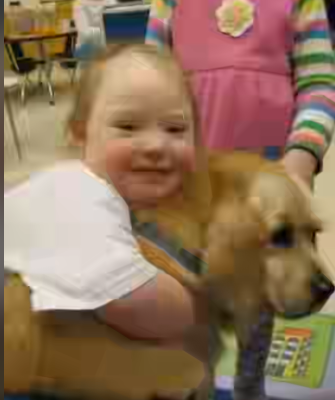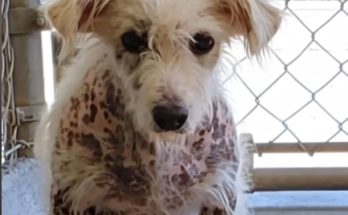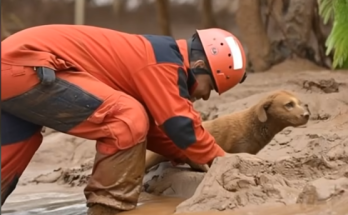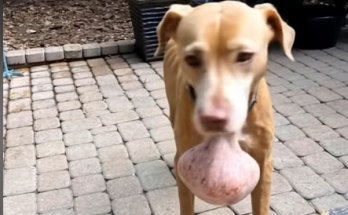The first few weeks of school were tough. Since starting kindergarten, Mara mostly kept to herself. During circle time, she’d sit quietly on the rug with her arms crossed and eyes cast downward. Both teachers and classmates tried to engage her, but Mara just wouldn’t open up.
At home, she was a different child—chatty, playful, and curious. But at school, she became shy and withdrawn, and I didn’t know how to reach her.
Then one morning, the school counselor called me. “We’re trying something new today,” she explained. “A therapy dog is visiting the classroom. Just a heads-up in case Mara reacts strongly.”
What happened next still amazes me.
When I came to pick Mara up, she wasn’t just smiling—she was talking. Sitting in the middle of the alphabet mat with her arms wrapped around a golden retriever wearing a bright blue vest, she was sharing everything with him.
The other children were gathered around, listening intently as if Mara’s words were the most important story they’d ever heard.
I overheard one girl ask, “Why didn’t she ever talk before?” and a boy quietly say, “Maybe she just needed someone who wouldn’t interrupt.”
When Mara saw me, she waved excitedly. “Mommy!” she called, letting go of the dog to run over. The golden retriever wagged his tail behind her as if he’d been waiting to meet me all day.
“This is Max,” Mara said proudly, pointing to the dog. “He’s a great listener.”
I knelt beside her, brushing her hair away from her face. “I can see that. Did you have fun today?”
She nodded eagerly. “Max helped me tell everyone about my turtle.”
“Your turtle?” I asked, puzzled since we didn’t have a turtle or any pet.
“Yes! Turtle is my imaginary friend at home,” she blushed. “Max thought Turtle was cool, so I told him all about how we play hide-and-seek.”
I looked at Max’s handler, a gentle woman with a kind smile, who nodded slightly—as if to say, “This happens more often than you think.”
That evening, Mara couldn’t stop talking about Max. At dinner, she described how soft his fur was, how he tilted his head when she spoke, and how he seemed to truly understand her when no one else did. It was like Max had unlocked a part of her that had been waiting to be heard.
Over the next weeks, Mara changed a lot. Max visited every Thursday, and Mara grew more confident each time. She started raising her hand, sharing stories during show-and-tell, and inviting classmates to play at recess.
But then came an unexpected turn.
One Thursday, the counselor pulled me aside. “I’m sorry to say this, but Max can’t visit anymore. His handler has health issues, so Max is retiring early.”
My heart sank. What would this mean for Mara? Would she withdraw again?
When I told her, she was heartbroken. “But why?” she asked, tears filling her eyes. “Doesn’t he love us anymore?”
I hugged her tightly. “Of course he does. But sometimes, both people and dogs need to take care of themselves. That doesn’t mean they stop caring.”
For days, Mara was downcast, barely touching her toys or books, often staring out the window hoping to see Max. It broke my heart, but I didn’t know how to help.
Then one Saturday morning, there was a knock at the door.
It was Max’s handler, holding his leash—and behind them was another golden retriever, smaller and younger, wearing a matching blue vest.
“Hi, Mara,” the handler said kindly. “Max wanted to say goodbye properly. And this is Luna. She’s training to be a therapy dog too. She could visit your class sometimes if you’d like.”
Mara’s face lit up. She hugged Max, crying happy tears, then gently reached out to pet Luna, who licked her hand approvingly.
From that day on, Luna became a regular at school. Max retired to a peaceful life, while Mara continued to grow under Luna’s care. She found her voice—not just for herself, but for others as well.
Months later, Mara wasn’t just participating in class; she was leading. She encouraged quieter kids to speak up, stood up for classmates who were teased, and her teacher praised her emotional and academic growth.
“She’s become a true leader,” the teacher said.
One rainy afternoon after school, Mara stopped at a park bench where an elderly man sat feeding pigeons. Next to him was a soaked scruffy terrier.
“Mommy, can we help?” Mara asked.
Before I could answer, she approached the man. “Is your dog okay?” she asked softly.
He smiled. “He’s fine—just hates the rain.”
Mara knelt by the dog and asked, “May I share my umbrella with him?”
The man nodded warmly. Mara held the umbrella over the little dog, and I realized that Max and Luna hadn’t just helped Mara find her voice—they’d taught her to use it to make the world kinder.
Years later, at her high school graduation, Mara gave a speech about kindness and connection. “Sometimes,” she said, “all it takes is one person—or one dog—to remind you that your voice matters. Mine was Max. Because of him, I learned to speak up not just for myself, but for those who need someone to stand with them.”
Her words moved me to tears. In that moment, I knew every challenge had been worth it.
The lesson? Small acts of compassion can create powerful changes. Whether it’s a therapy dog listening or a child sharing an umbrella, these moments spread kindness in ways we might never fully see.



